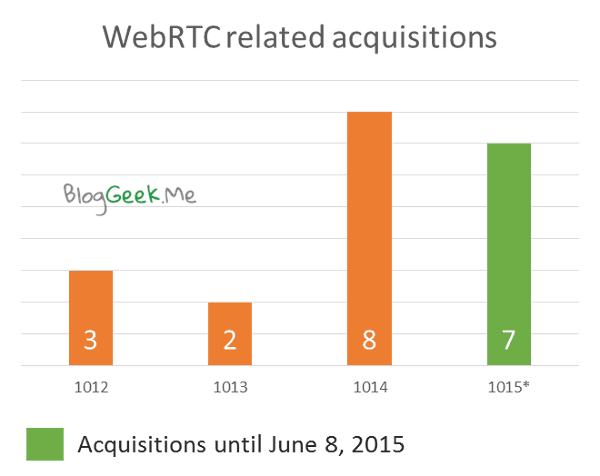Another week, another WebRTC related acquisition took place.
Since the Tropo acquisition just a month ago, we had two more acquisitions:
- Fuze acquired LiveMinutes – that at the same time it raised $20M more. Fuze itself made use of WebRTC as an access point to its video conferencing service, and LiveMinutes focused on collaboration and used WebRTC for video chat
- Broadsoft acquired mPortal – an outsourcing vendor focusing on mobile communication apps, catering large enterprises and telcos
When Atlassian acquired Jitsi I was a bit worried. We were nearing the end of April with only 3 acquisitions in 2015. With 8 acquisitions in 2014, this looked like another “boring” year. Well… we’re now into the 7th acquisition of 2015 when it comes to WebRTC and we’re almost 6 months in.
The chart below shows the WebRTC related acquisitions we’ve had since WebRTC’s inception. We are growing steadily.

Most of the acquisitions this year are similar to the ones last year – they are about acquiring the market, the business models and the technology. Only two of them have been technology/acquihires (ScreenHero and Jitsi).
How will the second half if this year shape out to be? Which kind of vendors are we going to see acquired next?
This is shaping up to be a pretty interesting year for WebRTC.

In the graph the years are one millenium behind: 1012, 1013 etc
Oops… writing late at night is bad for my health.
Anyway, if you ask me, WebRTC should have been invented a millennium ago. We had to wait too much time for it to arrive.
I see this as a good trend for seeing more and more business and consumer applications embed real-time WebRTC communications as an integral part of each application. Essentially app-building companies with the vision that all apps must ultimately incorporate real-time communications are buying up the most experienced people in the market, along with whatever application-development acceleration their technology might bring!
This is bad news for organizations that are late to the party because they will be faced with a reduced WebRTC talent-pool as they try and build their own communications-enabled mobile and web applications. This may be somewhat ameliorated by using higher-level developer-friendly PaaS communication frameworks that bring together all the details – such as Twilio, Cisco/Tropo, TokBox,…
However, I also think this is also bad news for smaller WebRTC platform companies because the threat of sudden talent and technology acquisition, along with the kind of “use it for our own apps” dramatic strategy changes we have already seen in most of these so far, significantly increases the risk of relying on these platforms. I personally have recommended to projects that going beyond Twilio and/or Tokbox as a foundation for a new WebRTC application is a high risk approach, regardless of extra features or slightly lower pricing.
So while expected and “fun”, I think this acquisition trend is unsettling for those in the platform, versus application-level, mix – until you get acquired :)!
Thanks Lawrence.
While I tend to give similar advice, there are more than just Twilio and TokBox out there that show stability and are viable solutions. We’re not in a one-size-fits-all market, and each use case requires its own analysis.
We aren’t that big like Twilio or TokBox, but we see significant usage growth of our platform and it actually offers more capabilities than many big vendors can offer. WebRTC still has some bugs that requires polish that show usage levels aren’t that big like big vendors claim, otherwise – why our smaller company find them, for example https://code.google.com/p/webrtc/issues/detail?id=4710
Alexey,
I am aware of what your company, VoxImplant, is doing – and that’s exactly what I meant in my response – there is definitely room for different companies in this API space to offer services to different customers.
Great discussion here. The availability of PaaS providers like Twilio, Tokbox (and yes, Vox Implant), I thought would be enough. But I see someone like IBM Bluemix getting into the picture, and trying to make it even more easier for app developers. Bluemix people are talking about consumable APIs with RTC powered by Twilio.
As newer use cases come up and RTC-enabled apps proliferate, I feel such (Twilio-IBM) WebRTC PaaS-Cloud Development Platform combinations may increase, and it will be interesting to see the approach by Microsoft and Google here. Twilio itself runs on AWS, and so, Amazon might be having some plan up their sleeves as well.
More choice is always good for app developers. And anyway, the best WebRTC talent is not within the grasp of startup app companies 🙂
Kumar,
Thanks. Bluemix and other higher level abstractions existed in the past and will exist in the future. It will be interesting to see if they make it into the minds of developers and become popular enough to compete with the hardcore API platforms we see today.